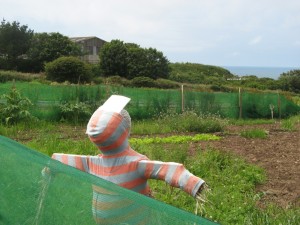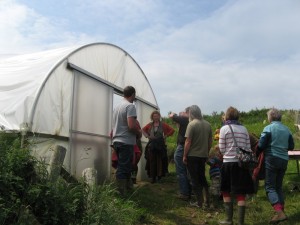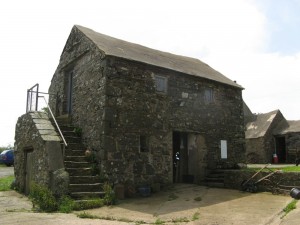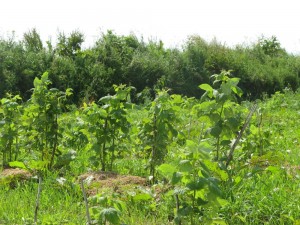Caerhys Organic Community Agriculture (COCA): members have this spectacular view of the Pembrokeshire coast from the vegetable field.
CSA? Community Supported Agriculture? What does it mean exactly? I have a much clearer idea after attending Wales’s first ‘Community Supported Agriculture Gathering’ in St Davids, Pembrokeshire, and the most important message for me was the importance of having an experienced farmer at the heart of a CSA project.
In the case of St Davids, they are the Miles family, notably farmer Gerald and his wife Ann, and their son Caz, at Caerhys just half a mile from the North Pembrokeshire coast at Berea.
The Miles family at Caerhys have diversified into beef, pigs, B&B, liveries, and now vegetables.
In the upside-down world we live in, where people who kick balls into nets and tap balls into holes in the ground can receive annual incomes with five or six noughts after the £ sign, family farm businesses are near the bottom of the scale and are fortunate if they make a living from their land. But while we can live without golf or soccer tournaments, without food we can’t do anything. The Miles family farm is 160 acres and used to produce milk, but falling milk prices led to the sale of the dairy herd in 2003. The farm had become organic in 1998, and the Mileses diversified into a Welsh Black beef suckler herd, Oxford Sandy and Black pigs, horse and pony liveries, and bed and breakfast.
Despite these ventures, the farm income was not sufficient to support Caz, although for Gerald and Ann their aim is to pass the farm from one generation to the next. This continuity strengthens rural communities and helps to maintain the social fabric.
A shelter fence encloses a seedling area — and the scarecrow’s hood doubles as a pocket for the weekly ‘to do’ list for the plot.
And then along came COCA, Caerhys Organic Community Agriculture. COCA dates from March 2010, when a small group of local people came up with a plan to bring more business to the farm and at the same time to supply local households with fresh vegetables.
The first crops were planted in June 2010, on two acres in a gently sloping field facing the ocean. By 2012, 40 households were receiving vegetables weekly. The target is for 70 member households by the end of 2012. This number, says COCA, should be enough for financial sustainability, including a regular wage for Caz.
The core group of 12, including Gerald and Caz, could not have made as much progress without grants from several organisations, more than £12,000 between June 2010 and March 2012, as follows:
- £1,000 to launch the project, from St Davids Eco City, June 2010.
- £500 for seeds, from Co-operative Bank, October 2010.
- £2,100 for a polytunnel, Pembrokeshire Association of Voluntary Services, February 2011.
- £2,500 to pay a membership recruitment officer, one day a week for six months, from TYF Adventure’s 1% Fund, March 2011.
- £995 for a muck spreader and roller, Co-operative Bank, April 2011.
- £1,000 for wages for a professional grower, St Davids Eco City, May 2011.
- £500 for a caravan to accommodate a volunteer worker, St Davids Eco City, December 2011.
£3,424 for tools, Pembrokeshire Association of Voluntary Services, March 2012.
Grant-funded polytunnel, growing tomatoes and cucumbers. COCA hopes to add two more.
In addition, Pembrokeshire Local Action Network for Enterprise and Development (PLANED), Organic Centre Wales, the Pembrokeshire Coast National Park Authority, and the Federation of City Farms and Community Gardens have all backed COCA with help and advice. The scheme members have dug into their own pockets, and work as volunteers, in addition to paying an annual subscription, £24 for 2012, and £40 a month by standing order for a full share of vegetables, for a family, or £20 for a half share, suitable for one or two people. A family buying a full share would spend £504 for the year, which works out at £9.69 a week.
This sturdy farm building is COCA’s ‘share shed’, where the produce is distributed.
The quantities, as well as the range, vary according to weather and season. The cold wet ‘summer’ of 2012 has delayed plant growth and made harvesting difficult.
This was a full share for the week starting May 4th, before the Jet Stream shifted south and abolished summer.
- 2kg potatoes
- 2 onions
- 560g carrots
- 170g radishes
- 2 leeks
- 40g stir-fry mustard greens
- 110g purple sprouting broccoli
- Cauliflower
- Bag of lettuce
- Bag of rocket
- Beetroot
- Spinach
The heavy toll from the dreadful weather is clear from the much smaller share on July 6th:
- 1kg potatoes
- 600g carrots (bought in)
- 150g carrots (home grown)
- 500g onions (bought in)
- Mangetout
By paying the same amount every month, members are providing COCA with a stable income, which is essential to meet the continuing costs of production.
Raspberries by the polytunnel. As well as soft fruit like this, COCA is planting fruit trees.
Organic produce is more ‘expensive’ than produce grown with synthetic fertilisers and other agrochemicals including pesticides, because the chemical products are artificially cheap — they do not factor in the cost of using irreplaceable fossil fuels, or of poisoning the environment. The synthetics replace human skill (in using crop rotations to build soil fertility, for example) and effort (hours of weeding!).
COCA still faces challenges – to gather a minimum of another 30 members, to engage new members in volunteering on the farm, to raise funds for two more polytunnels, and to maintain enthusiasm over the long term — but in the less than two-and-a-half years since the idea was floated, a huge amount has been achieved. I don’t think the COCA model can be copied exactly, because every location and every community are different, but reckon COCA shows the value of the community working with one or more family farms, and not in competition against them. The farmers bring machinery, buildings, years of experience and detailed knowledge of the land. The community can create a stronger local market, resulting in an income stream that can protect the farm business.
For more see westwalesnewsreview.wordpress.com/2012/07/…/how-to-save-family…




